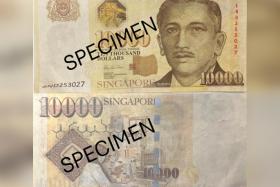He gives hope to those on death row
Lawyer wins award for pro bono work in capital offence cases
Even after appealing twice, his client was still sentenced to hang for trafficking in drugs.
But lawyer Eugene Thuraisingam held on to hope that he could save his client, Dinesh Pillai Reja Retnam, a Malaysian national who was convicted in 2011.
Just when it seemed hopeless, an amendment to the law allowed Mr Thuraisingam to apply for a re-sentencing.
His client, who was found to be suffering from depression when caught trafficking in 19.35g of heroin in 2009, became the first drug convict to escape the noose because of his mental condition.
Dinesh Pillai, who was given life imprisonment, is just one of many clients Mr Thuraisingam has saved from the death penalty in the past 12 years.
Yesterday, Mr Thuraisingam, 41, was conferred the Lasco Award - in recognition of his commitment and service to the scheme, state and community - at the inaugural Tri-Court Volunteers Appreciation Dinner.
Since January 2012, he has handled 13 cases - six trials and seven appeals under the Legal Assistance Scheme for Capital Offences (Lasco).
Lasco is a scheme which ensures that all people facing capital charges in the High Court are given legal representation by pro bono lawyers.
There are about 200 lawyers on board this scheme.
Mr Thuraisingam said that his wife and three children, aged between five and eight, were proud of him for receiving the award, but he admitted that there have always been mixed emotions when handling cases involving the death penalty.
Referring to Dinesh Pillai's case, he said the Malaysian was paid RM200 (then S$80) to carry a package containing drugs into Singapore.
"I was happy that I saved someone from the gallows. Yet I was also sad because over a RM200 profit, someone has to spend the rest of his life in prison," he said.
Mr Thuraisingam also represented another Malaysian, Wilkinson Primus, who was caught with 35.66g of heroin in his motorcycle when riding into Singapore on Nov 3, 2008.
Wilkinson was given the then-mandatory death penalty in 2009.
But in 2014, Mr Thuraisingam applied for a re-sentencing under the amended laws, relying on psychiatric reports that Wilkinson was suffering from major depressive disorder and was "performing at an extremely low level of intellectual functioning" at the time.
The prosecution did not object to the application and Wilkinson was also given life imprisonment.
Working such capital charge cases are never easy and are always stressful, said Mr Thuraisingam.
"The pressure is very high. It's extremely intense," he said.
"What most of us do is to take a step back and be objective, because you won't do the client any good if you don't distance yourself from the fact that he is facing capital punishment.
"So know your law well, know the facts well and fight hard to the best of your ability," he said.
Mr Thuraisingam is full of praise for the Lasco scheme.
He said: "Without the dedication and compassion shown by the many lawyers who participate in this scheme, there would be no representation for these people in court.
"Because none of them can afford lawyers. They are the poorest of the poor, some who are exploited for RM200."
Mr Thuraisingam, who is against the death penalty, said he will continue to fight to save lives.
"The simple reason is that none of us can say why we are here on earth and where we go to when we die.
"When you cannot answer that question, I feel you have no right to take away life," he said.
I was happy that I saved someone from the gallows. Yet I was also sad because over a RM200 profit, someone has to spend the rest of his life in prison.
- Lawyer Eugene Thuraisingam on one of his cases
Pro bono work 'bridges gap': CJ
Judicial volunteers and pro bono services are essential in making justice accessible to those in need, said Chief Justice Sundaresh Menon at the inaugural Tri-Court Volunteers Appreciation Dinner, held at the Grand Copthorne Waterfront Hotel, last night.
For the first time, the judiciary, comprising the Supreme Court, the State Courts and the Family Justice Courts, came together to show its appreciation and recognise the contributions of volunteers in pro bono work.
In the last three years, the number of judiciary volunteers - including lawyers as well as volunteers, such as engineers, lecturers and retirees who serve as mediators and counsellors - grew by about 20 per cent, from 229 in 2014 to 284 this year.
VITAL TO JUSTICE
Said CJ Menon: "The fact is there are the disadvantaged in society who lack the means to pay for legal services that would allow them to access justice in a meaningful way.
"It is here that pro bono work bridges the gap."
He referred to lawyers and non-lawyers, such as volunteers who provide mediation or counselling services, and said both groups are equally vital to the administration of justice.
Last night, four volunteers were accorded Outstanding Court Volunteer Awards for their outstanding work in the State Courts or Family Justice Courts, alongside Mr Eugene Thuraisingam, who was conferred the Lasco Award.
Twenty-three volunteers also received long service awards.
Get The New Paper on your phone with the free TNP app. Download from the Apple App Store or Google Play Store now



